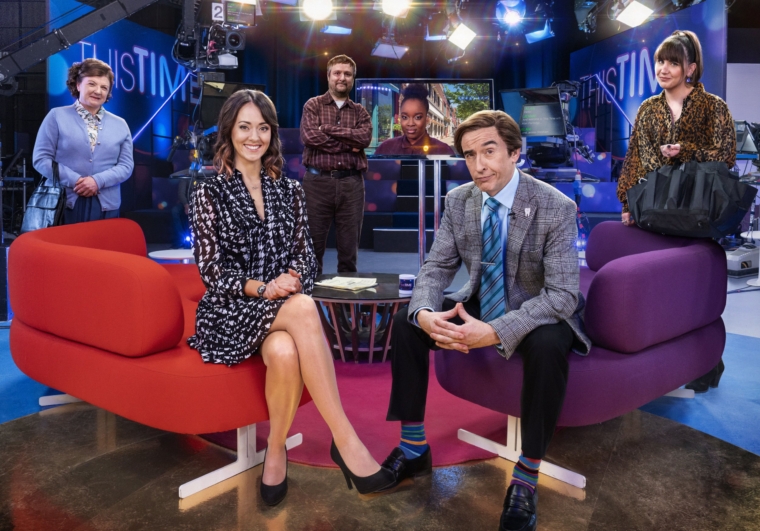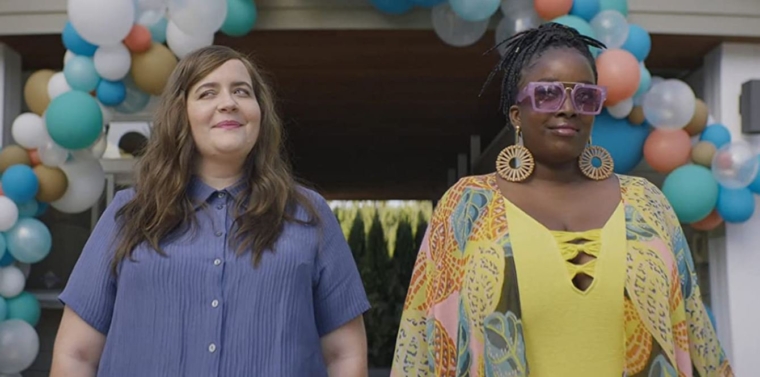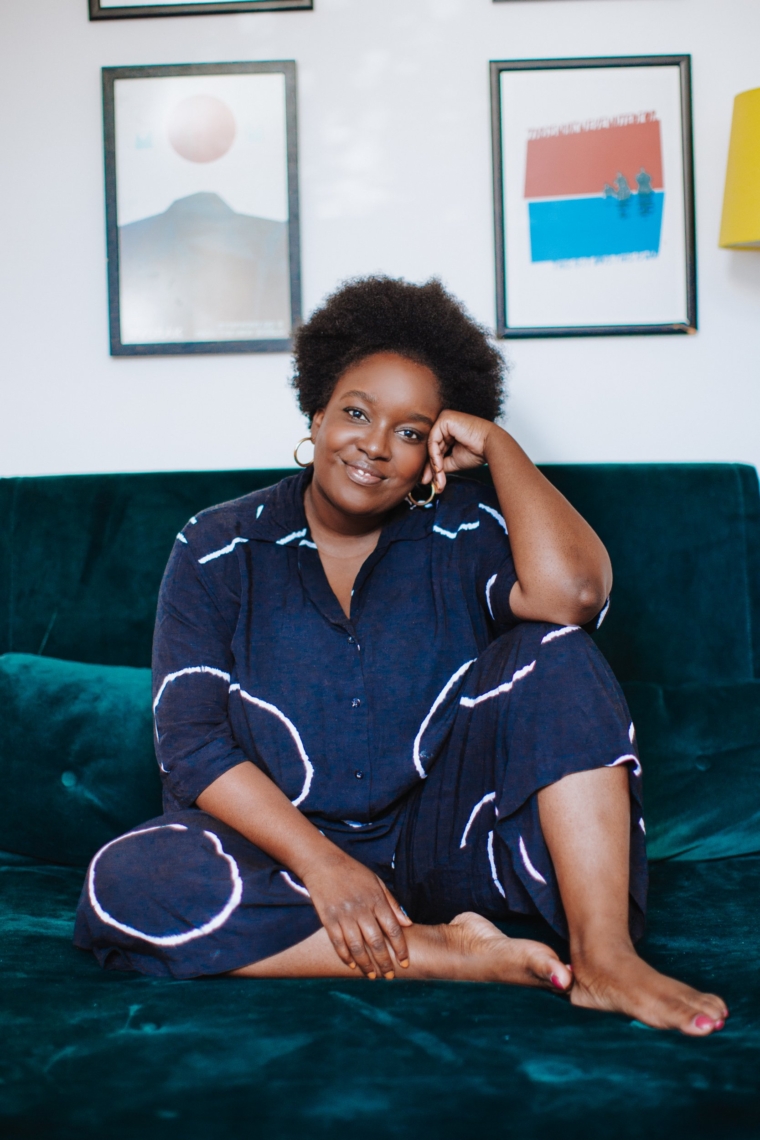Lolly Adefope always knew that she wanted to work in comedy. She watched The Day Today and Peep Show and thought, “I want to do what they’re doing”. So she applied to Cambridge, thinking she’d join the university’s star-making drama club, Footlights, but she didn’t get in. Then, she applied to drama school, but she was rejected. Finally, she went to the Edinburgh Fringe and got a job handing out flyers. “I did it for one day, hated it, then quit.”
Still, she kept the faith. A couple of years later, to her parents’ bafflement, she resigned from her office job and took her first five minutes of material to the Fringe, performing in character as Gemma, a chatty customer services adviser – “I’m really random, I’m genuinely, like, so mad…” – who is doing her first stand-up gig and has an unwavering faith in her ability to make it in comedy.
“I don’t think I ever had a plan B,” says Adefope, 30, from her home in east London. She is dressed in a bright orange sweatshirt, with a neon pink scrunchie in her hair which matches her nails; on the wall behind is a print of David Hockney’s A Bigger Splash. “I thought, I’ll see how this goes and if I’m not good at it, fine, I just won’t do it. But if I am good at it, surely I should do it rather than a job I don’t like.”
When she puts it like this, with a modest shrug – out of character, Adefope is unassuming, tinder dry, a little diffident – it sounds so simple. And indeed, since that debut in 2014, her rise has been textbook. Two well-received solo shows at the Fringe – Lolly and Lolly 2 – followed, leading to roles in sitcoms This Time with Alan Partridge, Ghosts, Stath Lets Flats, Pls Like, Plebs and Damned, to name a few. Then, just as she was preparing to take Lolly 3 to Edinburgh, she also happened to break America.

The way she tells it, it was a twist of fate, a quirk of rescheduled flights, right place and right time. “My agent said, ‘no, you’re really good’. But I can’t tell myself that,” she mutters. It was three years ago and she was in New York for a week of meetings and auditions for parts that she knew she wouldn’t get. The day before she was due to fly out, her agent called and told her about a read-through for Miracle Workers, a new sitcom starring Daniel Radcliffe and Steve Buscemi; one of the parts was still be cast, so Adefope went along to read in.
“I was thinking, ‘Ok everyone here is in this show and I’m not. So I don’t want to put loads of energy in because it will look really lame’”, she recalls. It turned out that the character she was playing, Rosie, is sarcastic and perennially unimpressed, too. “So, it kind of worked,” she says. She got the part and now counts Radcliffe and Buscemi as friends. “It still feels weird that I text Steve Buscemi,” she says. What about? “He did a GQ profile and the pictures were so amazing. I said, ‘you’re looking really dapper, Steve,’” she snorts. “Hopefully we’ll stay in touch.”
Despite the pandemic, Adefope has worked almost non-stop over the past year, flitting between filming the American sitcom Shrill in Portland and BBC comedies Alan Partridge and Ghosts; in the latter she plays Kitty, an unrelentingly cheery, dead, noblewoman in a vast Georgian gown. “I would say the corset is almost worth it,” she says, deadly serious. “For the feeling that you get when take the corset off.”

In This Time with Alan Partridge, which returns for a second series on Friday night, Adefope plays Ruth Duggan, a correspondent on the show who cannot, will not, disguise her contempt for the show’s host. Their relationship got off to a bad start when Alan “splashed shandy on her at the Pride of Britain Awards”, he thinks. Now, as he asks questions and pontificates on the issue of the day – be it a third runway at Heathrow or driverless cars – Duggan witheringly corrects or simply ignores him.
When Adefope auditioned for the part, she had only one thought: “I have to have this”. At school in south London, she would watch clips of The Day Today and Knowing Me, Knowing You with her friends via a dodgy site because YouTube was banned. “I think it’s the thing I’m most proud of, in terms of my teenage self would definitely be most excited for me.”

In this second series, she has tried to bring a bit more of herself to Ruth, she says. “To bring in some of my noises and facial expressions in a way that still feels like it’s Ruth.” When she acts, she tries to think how she can make it a part that only she could play. When she first started working on Shrill, in which she plays Fran – queer, straight-talking and very cool best friend to Aidy Bryant’s lead, Annie – she worried that her British intonations might drag the comedy down.
“The director would say, ‘Okay, can you say, ‘What are you, a narc?’ And I’d be like, ‘There’s absolutely no way, I’m so sorry.’ I was paranoid that I would just stick out and ruin the mood.” Then she realised that her Britishness was what made the role her own. “So I tried to lean into it a bit more, because that’s what’s funny.”
The world hasn’t really caught up to the different perspectives on fat bodies and women’s bodies. It just takes time
Shrill returns for its third and final season next month. Adefope has to tap into a different level of confidence to play Fran, she says. “She’s so cool, she intimidates me.” The show is based on Lindy West’s memoir and has been praised for its body-positive stance. In the first series, a pool party scene crammed with plus-size revellers, directed by Shaka King (Judas and the Black Messiah) was hailed as iconoclastic for the sheer joy it captured. “For a long time, the spectacle of fat women laying aside their inhibitions was a punchline at best, a freak show at worst,” wrote Andrea Laurion in Slate.
“When they were filming the scene, Shaka said, ‘don’t just film their faces, film their bodies’,” recalls Adefope. “This was a group of people who have not got traditionally attractive bodies, celebrating their bodies together. And I don’t know if I’ve seen it elsewhere since.”
The costume department on the show is, she says, the best she’s ever worked with. “It’s the first time I’ve been to a fitting and come out feeling more confident than I do in my own clothes.” She’s not convinced it has started a TV revolution, though, pointing out that Insatiable, a Netflix show in which the lead actress wore a fatsuit and provoked over 100,000 people to sign a petition calling for its cancellation due to its ‘fat-shaming’, was renewed for a second series. “I feel like nothing changes. Netflix will continue to make these shows and people will still get angry on Twitter. The world hasn’t really caught up to the different perspectives on fat bodies and women’s bodies. It just takes time.”

Last year, Adefope made a sketch for E4, in which she plays herself, auditioning for the role of James Bond. Or, as the unseen casting director corrects her, “Black James Bond.”
It’s a version of a sketch she first performed at the Edinburgh Fringe five years ago, in which she tried out for the role of “Black Hermione” in Harry Potter; it was inspired by a real-life audition at which she was asked to read a part in an “African accent”.
It is a perfectly timed piece of comedy writing – funny, subtle and devastating. And not a lot has changed in the industry since she first wrote it. “When you look at the biggest opportunities for comedians in the UK, it doesn’t necessarily seem to me like the aim is to create something diverse and give opportunities to lots of people and tell different stories. [The aim] is to do the same thing and appeal to the mainstream as easily as you can.”

In 2018, Adefope spotted the line-up for a Christmas charity comedy gig, organised by Harry Hill, which featured 23 white comedians. She shared it with the tweet, “Someone’s dreaming of a white Christmas”, and found herself, via some defensive replies from Jason Manford, embroiled in what some newspapers called a “race row”. I ask her whether a line-up like that would still get announced today.
“Yeah, I think it would definitely. I think there would also be more gigs now that aren’t like that. But people want to book big names because they want to sell tickets. And making something diverse… people aren’t really willing to take that risk. They don’t understand that in order to be a big name, you have to be given the opportunities.”
She thinks that if a white male comedian had tweeted the same thing, there wouldn’t have been a “row” in the same way. It was, apart from anything else, a good one-liner. “I just like making quite silly comedy. I’m not here to be an activist necessarily. I’m here to make people laugh. And if something really annoys me, then I’ll pipe up about it, but that’s not my job. That clash is built on the fact that it’s a Black woman speaking out about something. It was never seen as… a joke.”

A year later, she wrote a comedy short for BBC iPlayer, Sorry, in which she plays an actress on her way to her first Hollywood premiere when she discovers she’s been cancelled. Her plans to become “the Black Jennifer Lawrence” are derailed by an old tweet from 2007: in its final scene, it points out the different responses to a Black woman saying something controversial and a white man, say, using a racial slur.
It was that same sharp, droll eye for inconsistencies and pat hypocrisy that last year led her to reply to David Walliams’ tweet in which he shared a link to Clive Myrie’s BBC report on racism and police training, with ‘This you?’ and a picture of the actor playing an obese black woman in Little Britain. Three days later, the comedy was removed from streaming services.
“It’s kind of annoying feeling like we are the ones who have to speak out about it first and bear the brunt of all of the toxicity. And then maybe slowly, people will also start to talk about it and things will start to change. It’s always painted as we’re these angry, ungrateful comedians who want it to be a war, rather than people who are just wittily making asides.”
She is now, very slowly, writing a sitcom (“I want it to be perfect”) and is working a new podcast, produced by Baby Cow, called Fanmail, a tongue-in-cheek vanity project in which she reads out messages from imaginary fans and interviews celebrities (played by comedians) about why they’ve loved working with her.
And when the clubs finally reopen, she will bring back her live comedy night, Lolly and Friends, to the Moth Club in east London, too. “I like to think of myself as a comedian as well, and not just an actress. I feel like you can’t do that unless you’re gigging. You can’t say, ‘No, no, I am a comedian, I did a gig five years ago’”, she rolls her eyes. “Alternating between the two is fun.”
This Time with Alan Partridge starts on BBC One on Friday 30 April at 9.30pm; Shrill returns to BBC Three soon
Struggling to find your next favourite TV series?
The i on TV newsletter is a daily email full of suggestions of what to watch as well as the latest TV news, opinions and interviews. Sign up here to stay up to date with the best new TV.

